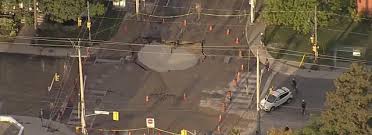
The Growing Concern of Sinkholes in Toronto
Sinkholes have emerged as a pressing issue in urban environments, especially in cities like Toronto, where infrastructure is heavily impacted by weather patterns and aging utilities. These sudden ground collapses pose significant risks to public safety, transportation, and city planning. As climate change affects precipitation patterns and overall weather extremes, understanding and mitigating the risks associated with sinkholes has become increasingly relevant for municipalities.
Recent Sinkhole Events in Toronto
In recent weeks, residents of Toronto have witnessed several sinkhole events that raised alarms among city officials and the public alike. One notable incident occurred on October 12, 2023, when a large sinkhole opened up on Bloor Street, swallowing a section of roadway and blocking access for vehicles and pedestrians. Fortunately, no injuries were reported, but the incident caused substantial disruptions and forced local businesses to close temporarily.
City engineers attributed this sinkhole to several factors, including heavy rainfall in the preceding weeks, which resulted in saturated soil conditions. The city has advised residents to remain alert and report any unusual ground shifts or disturbances in their neighborhoods.
Causes and Contributing Factors
Sinkholes are usually caused by the erosion of underground water, which creates voids that lead to collapses when the ground above can no longer support the weight. In Toronto, factors such as aging sewer systems, inadequate drainage, and heavy precipitation contribute significantly to this phenomenon. The city’s soil composition, mainly consisting of clay, exacerbates the situation by retaining water and increasing the potential for erosion.
Furthermore, urban development, including construction and excavation, can destabilize the land, making areas more susceptible to sinkholes. The city of Toronto has launched several initiatives to assess and upgrade its infrastructure, which aims to curb the risk of future sinkholes.
Future Considerations and Safety Measures
In light of recent events, municipal officials emphasize the importance of infrastructure assessments and public awareness campaigns regarding sinkholes. The city is also investing in modernizing stormwater management systems to better handle extreme weather events. Citizens are encouraged to be vigilant and report any signs of ground instability to city authorities.
Moving forward, the City of Toronto is committed to improving its infrastructure and developing better urban planning practices to minimize the potential impact of sinkholes. With climate-related challenges anticipated to increase, addressing these concerns is essential for ensuring public safety and urban resilience.
Conclusion
Sinkholes in Toronto highlight the vulnerabilities of urban infrastructure in the face of environmental changes. As residents and city officials work together to address these challenges, public awareness and proactive measures will be vital in safeguarding communities against future disturbances.



